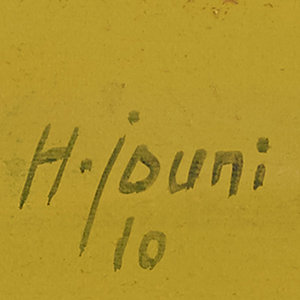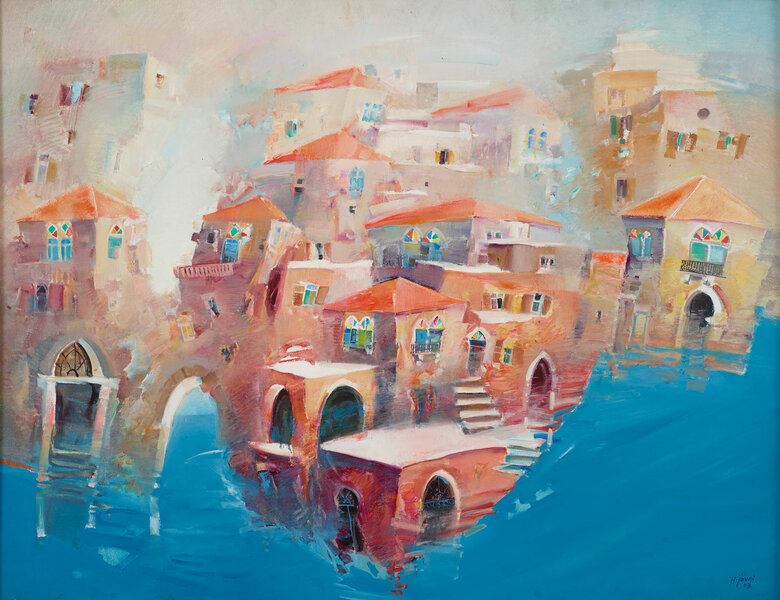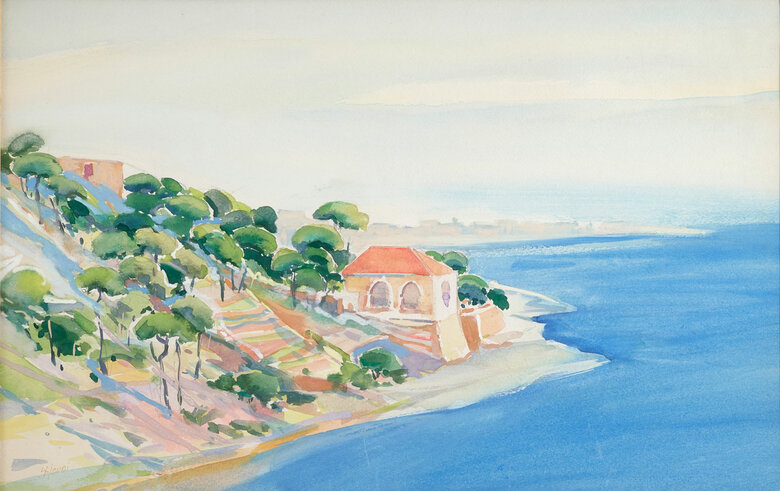Born in 1942 in Zuqaq al-Blat, Beirut, Hassan Jouni developed an early affinity for drawing and painting: extant sketches date back to 1949, when the artist was just seven years old. The magic...


HASSAN JOUNI, Lebanon (1942)
Bio
Written by YACOUB RUBAI
Born in 1942 in Zuqaq al-Blat, Beirut, Hassan Jouni developed an early affinity for drawing and painting: extant sketches date back to 1949, when the artist was just seven years old. The magic began after his uncle gifted the young boy a bundle of colored crayons, whose vivid palette became a central element of his work. The crayons were not the only feature of his childhood to have a major impact on Jouni’s work, however.
As a seven-year-old, he stumbled over the roof of his family’s home, and though he survived the fall, it nevertheless left an impression on him. For years after the incident, the artist dreamed of soaring in the sky and savoring the view below; later, Jouni would develop a practice around translating these dreams into landscape paintings.
At the age of nineteen, Jouni reinforced his passion for painting during a visit to the Salon Du Printemps exhibition at UNESCO Palace, where he became acquainted with Cesar Gemayel and other prominent Lebanese artists. Jouni went on to earn diplomas from the Lebanese Academy of Fine Arts (1964) and the Foster Academy of Fine Arts in Madrid (1965), which he attended under the auspices of a grant from the Lebanese University.
After graduating from the Foster Academy, Jouni earned the title of professor of drawing and painting at Madrid’s San Fernando Royal Academy of Fine Arts in 1966. Madrid stimulated Jouni’s drive for learning and seeking beauty. He approached each experience as a lesson in art, describing his time there as “beautiful because I felt like every second in Europe had significance.” Jouni made the most of his time in Madrid by attending regular operas and concerts, frequenting the Prado Museum and strolling through the Retiro Gardens, all the while ravenously consuming poetry, history and philosophy.
Though Madrid provided him with abundant inspiration, the artist's love for his country led him back to Beirut in 1970. Lebanon was integral not only to Jouni’s work, but also his sense of self. The country represented, per his description, “an identity, a way of thinking, a way of life.” Upon his return, Jouni began exhibiting work and teaching at the Faculty of Fine Arts and Architecture at the Lebanese University, where he eventually headed the department of drawing and painting and remained for over 18 years.
Jouni returned to a thriving Beirut that had cemented its place as the Middle East’s capital of arts and culture, playing host to a surge of art exhibitions and literary readings and boasting a thriving nightlife. For Jouni, the city was a place where “one could roam the streets all night without getting anywhere, while being wherever one wanted.” This period was unfortunately interrupted by the start of the Lebanese Civil War in 1975, during which only painting could alleviate the stress of constant violence. As an antidote, Jouni indulged nostalgia by depicting Beirut’s golden age in his work. His task became to comment on the progression of Lebanese society and immortalize the image of the city he was raised in. By depicting quotidian scenes of the street and Lebanese cafés, the artist created portrayals of a fleeting popular culture, preserving and ushering its heritage into the modern.
Often sequential in his work, Jouni deconstructs his themes over multiple canvases through a transitional painting style. A project that began in one painting would continue in another, adding further context and sometimes shifting gradually from figuration to abstraction. Sequences often evolve from simple to complex and vice-versa, resulting in varied examples of complex narrative through painting.
Jouni works primarily with oil on canvas and considers painting to be “the translation of the Universe.” He is more interested in literal depictions than abstractions, and thus maintains a figurative practice that evokes impressionism in color and brushstroke yet seems expressionist in form. By depicting human interactions and experimenting with color and movement, Jouni imbues emotion into otherwise documentary subject matter in hopes of conveying that “we are forever close to other human beings who understand what we feel.” This ethos of empathy is communicated in “Emigration from the South” (1981), which depicts a presumably mobile family of migrants in a static frame, their bodies blending into a single unit.
Currently based in the Manara atelier he founded in 1980, Jouni continues to paint, conjuring through his work a Beirut that is at once bygone and still present.
Sources
Hassan Jouni, interview by Dalloul Art Foundation (DAF Beirut), Beirut, February 13, 2019.
"Creative Deconstructions." In Art from Lebanon: Modern and Contemporary Artists, by Nour Salamé Abillama, Marie Tomb, Amin Maalouf, Joseph Tarrab, Cesar Nammour, Maha Azizé Sultan, Fayçal Sultan, and Gregory Buchakjian, 350-353. 1st Edition ed. Vol. I. Beirut, Lebanon: Wonderful Editions, 2012.
Khal, Helen. "Hassan Jouni." In Resonances, 82 Lebanese Artists Reviewed by Helen Khal, edited by Gabriela Schaub and Cesar Nammour, 158-61. Beirut: Fine Arts Publishing, 2011. http://kiyan-art.com/artists-b...
CV
Selected Solo Exhibitions
2002
Gallerie Alwan, Beirut, Lebanon
2001
Gallerie Alwan, Beirut, Lebanon
1998
Gallerie Alwan, Beirut, Lebanon
1996
Gallerie Alwan, Beirut, Lebanon
1995
Gallerie Alwan, Beirut, Lebanon
1994
Gallerie Alwan, Beirut, Lebanon
1993
Hall of Houssam Hariri, Beirut, Lebanon
1992
Galleria Agial, Beirut, Lebanon
1990
Hall Khan Franj, Saida, Lebanon
1989
Hall of the Superior Council of Letters and Arts, Kuwait
1989
Hall El Mountada Beirut, Lebanon
1986
Hall of Expert - Manara, Beirut, Lebanon
1985
Epreuve d’Artiste, Beirut, Lebanon
1984
Hall of Sheraton, Kuwait
1983
Smuggler’s Inn, Beirut, Lebanon
1983
Hall of Holiday, Kuwait
1981
Spanish Cultural Center, Beirut, Lebanon
1980
Spanish Cultural Center, Beirut, Lebanon
1978
Hall Rigoletto Drawing and Watercolors, Beirut, Lebanon
1975
Galleria Contact, Beirut, Lebanon
1974
Galleria Contact, Beirut, Lebanon
1973
Hall of Spanish Cultural Center, Beirut, Lebanon
1972
Hall of Arts and Letters, Beirut, Lebanon
1971
Hall of Arts and Letters, Beirut, Lebanon
Selected Group Exhibitions
2012
Art from Lebanon - Modern and Contemporary artists: 1880 – 1975, Beirut Exhibition Center, Beirut, Lebanon
2010
Collective exhibition on Armenian Genocide victims, Hamazkayin Lucy Tutunjian Art Gallery, Beirut, Lebanon
2009
The Road to Peace: Paintings in Times of War, 1975-1991, Beirut Art Center, Beirut, Lebanon
2003
Frankfurt, Germany
2002
Geneva
2004
Damascus, Syria
2001
Dubai
1998
Dubai
1990
Washington, United States
1987
Galleria Cofa, London, England, United Kingdom
1986
Le Petit Palais, Paris, France
1975
Biennale Alexandria, Egypt
1975
Sao Paolo, Brazil
1973
Manheim, Germany
1973
Sao Paolo, Brazil
1972
Biennale Kuwait
1971
Damascus, Syria
Collections
Sursock Museum, Beirut, Lebanon
Military Museum of Damascus, Syria
Museum of Modern Art, Sao Paolo, Brazil
Museum of Plastic Art, Amman
Hall of the Kuwaiti Artists Association, Kuwait
Ramzi and Seda Dalloul art Foundation, Beirut, Lebanon
Awards
1997
Gold Medallion in painting and drawings, Biennale Latakia, Syria
Press
الجزيرة.نت.pdf
الفنان التشكيلي حسن جوني اللوحة منفاي الأجمل والأقسى Laha Magazine.pdf
Al-akhbar.pdf
حسن جوني... سجلّ اختفاء.pdf
الفنّان التّشكيلي حسن جوني بقلم_ حسين أحمد سليم.pdf
المدن - حسن جوني_ لم تهرم اللوحة.. لكن لا سوق لها.pdf
أبطال لوحة حسن جوني يرتدون بيوتهم ثياباً.pdf
AgendaCulturel.pdf
Arab artists_ Jouni captures the faces of people.pdf
الفنان التشكيليّ حسن جوني_ الثقافة العالميّة مهدّدة.. والفنّ مسؤول – جريدة البناء _ Al-binaa Newspaper.pdf
الجمهورية _ الفنان حسن جوني.. لوحاته تحاكي الإنسان وقيمتها ارتفعت آلاف المرات!.pdf
الفنان حسن جوني_ انا انسان لوحتي.pdf
HASSAN JOUNI Artwork
Become a Member
Join us in our endless discovery of modern and contemporary Arab art
Become a Member
Get updates from DAF
Follow Artists
Save your favourite Artworks
Share your perspectives on Artworks
Be part of our community
It's Free!
We value your privacy
TermsCookiesPrivacy Policies
Become a Member
Get updates from DAF
Follow Artists
Save your favourite Artworks
Share your perspectives on Artworks
Be part of our community
It's Free!
We value your privacy
TermsCookiesPrivacy Policies
Become a Member
Get updates from DAF
Follow Artists
Save your favourite Artworks
Share your perspectives on Artworks
Be part of our community
It's Free!
We value your privacy
TermsCookiesPrivacy Policies
Welcome to the Dalloul Art Foundation
Thank you for joining our community
If you have entered your email to become a member of the Dalloul Art Foundation, please click the button below to confirm your email and agree to our Terms, Cookie & Privacy policies.
We value your privacy, see how
Become a Member
Get updates from DAF
Follow Artists
Save your favourite Artworks
Share your perspectives on Artworks
Be part of our community
It's Free!
We value your privacy
TermsCookiesPrivacy Policies






